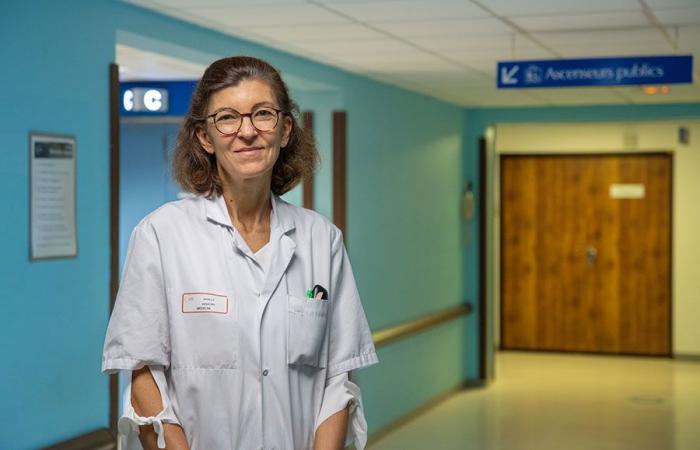Professor Isabelle Benatru was appointed head of the neurology department following the departure of Professor Jean-Philippe Neau. She looks back on her career and presents the activities of her department, between patient care and research.
Why did you choose the field of neurology?
During my externship, I had the opportunity to do a five-month internship in the neurology department of Professor François Mauguière at the Lyon neurological hospital, a department specializing in epilepsy. It was this internship that I really enjoyed that made me choose neurology in the internship competition. Neurology is a rich, vast and varied medical discipline. It treats many pathologies.
Why did you accept the position of head of the neurology department?
I have been head of the neurology department since October 2024, following the retirement of Professor Jean-Philippe Neau. I was a little reluctant at first because it seemed like a lot of responsibility. After some thought, I finally agreed. I found it interesting to ensure the department’s projects and the management of the team, to develop collaborations with other departments, to continue everything that Professor Neau had put in place. In January 2025, I will follow the management training provided by the School of Advanced Studies in Public Health in Rennes, offered as part of the Nova health cooperation group. This is a real opportunity because management is an important mission for a department head.
Tell us about the neurology department
The neurology department has sixty hospital beds. It is made up of two units located in two different wings. One of them is more focused on neurovascular pathologies. It has eight neurovascular intensive care beds, eleven post-acute stroke care beds, and ten conventional hospitalization beds. The other wing has nineteen conventional hospitalization beds for the treatment of all degenerative and inflammatory pathologies and abnormal movements, and nine weekday hospitalization beds. We also have three day hospital beds on the polar plateau. The medical team is made up of a university professor-hospital practitioner, Professor Nathalie Nasr, five hospital practitioners, doctors Laury Calton, Amélie Dos Santos, Foucaud Du Boisgueheneuc, Adrien Julian and Matthias Lamy, two clinical leaders, doctors Mathilde Ravault and Mathieu Mille, a shared assistant, doctor Marie Rideau, and myself. We have an important, rich and varied activity. Each doctor has a general neurology activity, but we also each have an area of expertise. Three of our doctors, doctors Marie Rideau, Laury Calton and Mathilde Ravault, provide advanced consultation on the Châtellerault site approximately two days a week. Dr Adrien Julian also visits the Montmorillon site every Wednesday for an advanced consultation. A significant part of the service’s activity concerns neurovascular pathology. We also treat inflammatory pathologies of the central nervous system in the broad sense, such as multiple sclerosis and related diseases, peripheral neuropathies and neuromuscular pathologies, neurodegenerative pathologies such as dementia, Parkinson’s disease and abnormal movements. , but also headaches, epilepsy, and of course neurological emergencies. We are responsible for different competence centers, and are a Parkinson Expert Center. Our activity leads us to work in close collaboration with other services such as radiology and interventional radiology, neurosurgery, anesthesia (in particular for thrombectomy activity and deep brain stimulation), physical medicine and rehabilitation. but also the clinical neurophysiology department of Professor Xavier Drouot. Finally, we have a neuropsychology unit.
-How does the service stand out in terms of research?
Our department is heavily involved in clinical research and particularly within the clinical neuroscience axis of the CIC of which I am responsible. Dr Adrien Julian, specialist in Alzheimer’s disease and Professor Nathalie Nasr, specialist in neuro-pathology
vascular, are members of the DECLAN axis of the CIC. Professor Nasr is also a member of INSERM unit U-1084 at LNEC. We also have a clinical research associate in the neurology department for neurovascular studies and studies on multiple sclerosis. All the doctors in the department participate in different academic or industrial research protocols. We are also investigators in internally promoted studies.
What are your challenges as department head?
I would like to continue the actions and projects initiated, develop our research activity and medical-care cooperation, and support paramedical projects. I also attach great importance to students and interns in DES neurology, to their training, and to listening to their professional project. But what is important to me above all is that each member of the service, doctors and healthcare team, feels good in their daily lives, flourishes in their professional activity, in order to ensure the quality of care provided to patients. .
Share the publication “Medical perspective: Professor Isabelle Benatru, head of the neurology department”






